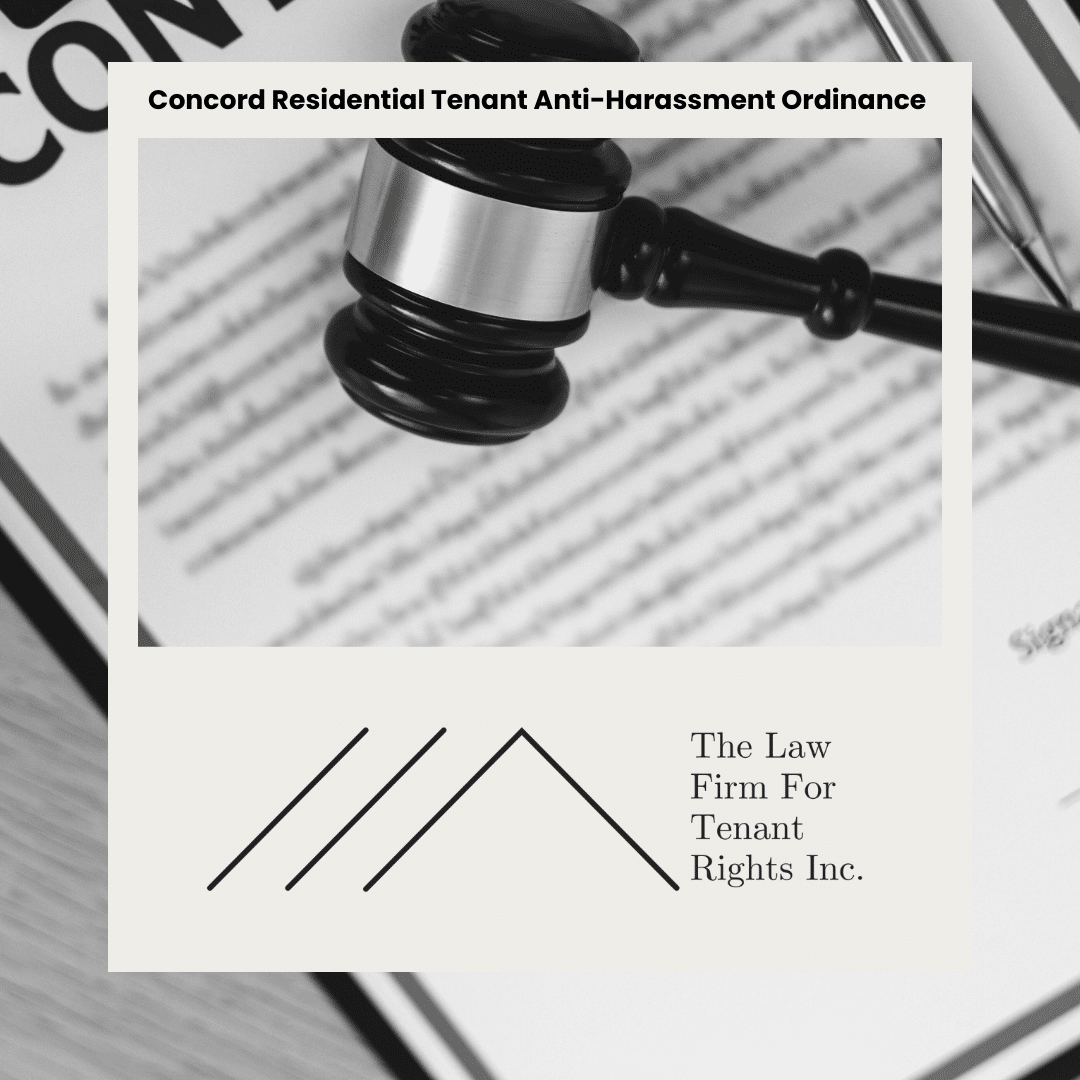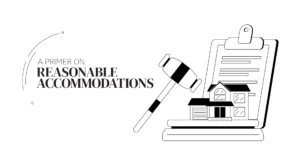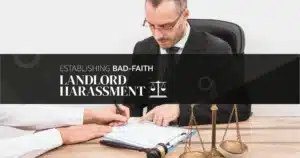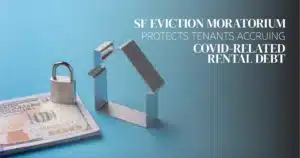Concord’s Residential Tenant Anti-Harassment Ordinance (Concord Municipal Code 19.50) became effective on July 28, 2022. The Ordinance protects tenants of residential buildings against harassment by their landlords.
There is also a new Rent Control and Eviction Ordinance in Concord, California. To read more about it, click here.
The Ordinance protects any tenant of a residential property, including any renter, tenant, subtenant, lessee, or sublessee of the residential property.
Tenant Protections Under the Residential Tenant Anti-Harassment Ordinance
The Residential Tenant Anti-Harassment Ordinance prohibits owners of residential properties from engaging in any acts or omissions that constitute harassment, as follows:
- Interrupting or threatening to interrupt a tenant’s quiet enjoyment of the residential rental property.
- Failing to maintain the residential rental property in a habitable state
- Abusing the right to enter the residential rental property
- Forcing or attempting to force a tenant to vacate the residential rental property through fraud,
- misrepresentation, intimidation, or coercion, or by removing a housing service in an attempt to get the tenant to vacate
- Discriminating against a tenant in violation of the law
- Misrepresenting information to a tenant, including misrepresenting to a tenant that they are required to vacate the property
- Refusing to accept rent payments or making it difficult for a tenant to pay rent
- Violating a tenant’s right to privacy
- Interfering with the right of tenants to unionize
- Other acts of harassment
Tenant’s Right to Quiet Enjoyment
The Residential Tenant Anti-Harassment Ordinance defines interrupting or threatening to interrupt a tenant’s quiet enjoyment of the residential rental property as any of the following activities:
- Conducting elective construction or renovation of the property without the tenant’s prior written permission
- Interrupting or threatening to interrupt the tenant’s utilities
- Preventing or threatening to prevent a tenant from accessing the property with the intent to evict the tenant from the property, including by changing locks, removing doors, or removing the tenant’s belongings from the property
- Failing to provide housing services in the rental agreement, other than in a local health and safety emergency
- Unilaterally requiring a tenant to sign a new lease or unilaterally imposing new lease terms, unless at the end of the lease or as permitted or required under the law
Landlord’s Failure to Maintain Property in a Habitable State
A landlord might fail to maintain the habitability of a property by doing any of the following:
- Failing to do timely repairs and maintenance
- Failing to exercise due diligence when making repairs
- Failing to comply promptly with a notice of violation and order to correct the violation issued by the city
- Violating the warranty of habitability
- Violating habitability and health and safety standards
Abuse of the Landlord’s Right to Enter
There are several ways in which a landlord might abuse the right to enter a residential rental property under the Residential Tenant Anti-Harassment Ordinance. Such abuses include:
- Entry for inspections is not permitted under the law, and not to conduct necessary repairs
- Entry or demands for entry outside of normal business hours, unless requested by the tenant or otherwise permitted under the law
- Entry despite a tenant’s reasonable request to change the date or time of entry
- Entry to show the property to a prospective purchaser unless proper notice and permission is given
- Photographing or recording the property outside the scope of a lawful inspection as stated on the notice of entry
- Misrepresenting the reason for accessing the property
- Failing to provide a time window for entry or providing an unreasonably large time window
- Failing to notify the tenant that entry is canceled
- Entries that are excessive in number for the reason stated on the notice of entry
Landlord Misrepresentation
The Residential Tenant Anti-Harassment Ordinance defines misrepresentation by a landlord as follows:
- Misrepresenting to a tenant that they are required to vacate the property or otherwise entice a tenant to vacate the property through misrepresentations or concealment of material facts
- Providing materially false information regarding tenant protections, including deliberate mischaracterization of the nature or effect of a notice to quit or other eviction notice or failing to translate certain rental agreements
- Taking action to terminate any tenancy, including service of an eviction notice, or bringing any action to recover possession of a rental unit based upon facts that the landlord has no reasonable cause to believe to be true or upon a legal theory that is untenable under the facts known to the landlord
Landlord Refusal to Accept Rent
Under the Residential Tenant Anti-Harassment Ordinance, a landlord makes an impermissible refusal to accept rent or makes it impermissibly difficult for tenants to pay rent if they:
- Refuse to acknowledge or accept receipt of a tenant’s lawful rent payment
- Refuse to cash or process a full payment rent payment for over 30 days after it is tendered
- Fail to maintain a current address for delivery of rent payments
- Fail to provide a receipt to a tenant for rent or other payments
- Failure to allow a tenant to pay rent and deposit security by at least one form of payment, which is neither cash nor electronic funds transfer
Violation of Tenant’s Right to Privacy
Violating a tenant’s right to privacy includes the following activities:
- Requesting information regarding residence or citizenship status, protected class status, or Social Security number, or refusing to accept equivalent alternatives to such information or documentation that does not concern immigration or citizenship status
- Releasing such information except as required or authorized by law or in violation of applicable state and/or federal law
- Requesting information regarding a tenant’s relationship status in violation of state or federal law
Other Prohibited Acts of Tenant Harassment
Other acts of harassment prohibited by the Residential Tenant Anti-Harassment Ordinance include the following:
- Communicating with a tenant in a language other than English or the tenant’s primary language for the purpose of intimidating, confusing, deceiving, annoying, seriously alarming, or harassing the tenant
- Communicating with a tenant via text message after the tenant has informed the landlord in writing that the tenant objects to communications via text message
- Engaging in other repeated acts or omissions that substantially interfere with or disturb the tenant and that cause, are likely to cause, or are intended to cause any person lawfully entitled to occupancy of a rental unit to vacate such rental unit or to surrender or waive any rights about such occupancy
- Securing any modification or waiver of any provision of the Ordinance from a tenant
Tenant Remedies
If a landlord violates any terms of the Ordinance, their tenant may bring a civil lawsuit against them, seeking injunctive relief, actual, statutory, or direct money damages, and any other relief that the court deems appropriate. For each violation of the Ordinance, the court may award the tenant between $2,000 and $5,000. If the tenant is over 65, the court may award the tenant an additional $5,000 for each violation.
A landlord and anyone who helps them violate the Ordinance is also liable for three times the actual damages a tenant suffers, or $1,000.00, whichever is more. Emotional damages may also be trebled (tripled) if the court finds that the landlord or the person who helped them acted in knowing violation of or reckless disregard of the Ordinance. Additional damages may also be awarded at the court’s discretion, including punitive damages, but the court may not award both treble damages (tripled damages) and punitive damages.
The court will award reasonable attorney fees to any successful tenant in their lawsuit. The court only awards attorney fees to a landlord if the court finds that the tenant’s lawsuit was frivolous.
The remedies available in the Ordinance are in addition to those available under applicable federal, state, county, or local law. If you believe your housing provider is violating the Concord Residential Tenant Anti-Harassment Ordinance, we encourage you to contact us today at (628) 200-3018 or fill out our intake form.






